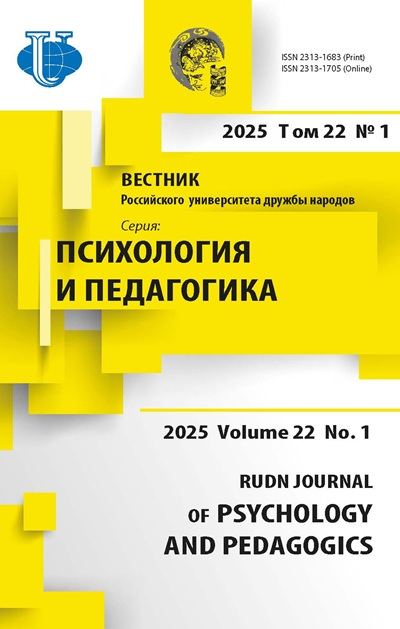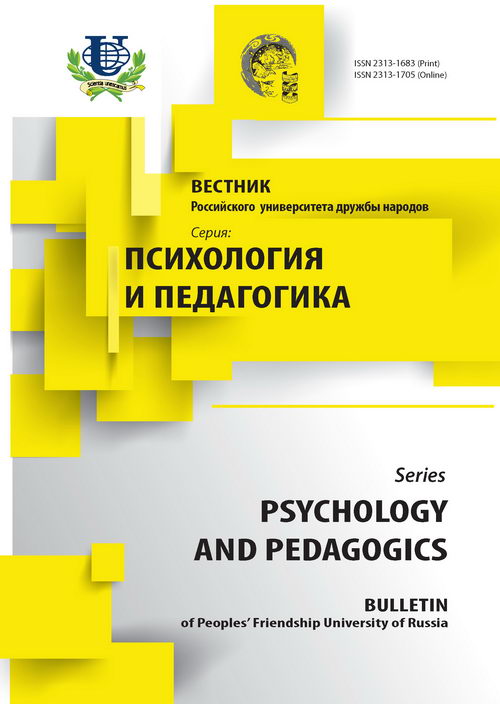ПОТОК И ОПТИМАЛЬНОЕ ПЕРЕЖИВАНИЕ: МЕТОДОЛОГИЧЕСКОЕ ЗНАЧЕНИЕ ДЛЯ ИНТЕРНАЛИЗАЦИИ И КОНТЕКСТУАЛИЗАЦИИ ПОЗИТИВНОЙ ПСИХОЛОГИИ. ЧАСТЬ 1
- Авторы: Рич Г.1
-
Учреждения:
- Ашока Университет
- Выпуск: № 2 (2016)
- Страницы: 7-18
- Раздел: Статьи
- URL: https://journals.rudn.ru/psychology-pedagogics/article/view/13419
- DOI: https://doi.org/10.22363/2313-1683-2016-2-7-18
- ID: 13419
Цитировать
Полный текст
Аннотация
Данная статья является первой из двух статей, посвященных одному из ключевых понятий позитивной психологии - вершинным переживаниям, называемым «поток», разрабатываемым психологом Михаем Чикесентмихайи - в качестве примера для рассмотрения некоторых вопросов, связанных с интернализацией позитивной психологии. В частности, обсуждаются методологические, психодиагностические и теоретические вопросы исследования состояния потока. Описаны количественные, качественные и смешанные методы изучения состояния потока, включая интервью, анкетирование и кейс-стади. Рассматриваются примеры исследований состояния потока в разных странах мира, поднимающих вопросы относительно качества психодиагностического инструментария, а также кросс кросс-культурных универсалий/различий. Предлагаемый автором подход не сводится к рассмотрению качественных и количественных методов (или антропологических и психологических перспектив) как конкурирующих между собой, он направлен на развитие конструктивного диалога, который признает сильные и слабые стороны каждого подхода, чтобы стимулировать использование смешанных методов исследования сильных сторон человека, чем часто пренебрегают в кросс-культурных исследованиях. В первой статье прежде всего рассматривается методологическое значение позитивной психологии, во второй - ее кросс-культурная значимость.
Об авторах
Грант Рич
Ашока Университет
Автор, ответственный за переписку.
Email: optimalex@aol.com
Факультет психологии
Список литературы
- Blacking J. How musical is man? Seattle, WA: University of Washington, 1974.
- Brown N.J.L., Sokal A.D., Friedman H.L. The complex dynamics of wishful thinking: The critical positivity ratio. American Psychologist, 2013, vol. 68, no 9, pp. 801-813.
- Crowe J. My first guitar: Tales of true love and lost chords from legendary musicians. Toronto, Canada: ECW Press, 2012.
- Csikszentmihalyi M. Beyond boredom and anxiety. San Francisco, CA: Jossey-Bass, 1975.
- Csikszentmihalyi M. Flow. New York, NY: Harper Row, 1990.
- Csikszentmihalyi M. Creativity. New York, NY: Harper Row, 1996.
- Csikszentmihalyi M., Rich G. Musical improvisation: A systems view. In K. Sawyer (Ed.), Creativity in performance. Greenwich, CT: Ablex, 1997, pp. 43-66.
- Csikszentmihalyi M. Flow. In A.E. Kazdin (Ed.), Encyclopedia of psychology. Washington, DC: Oxford University Press, 2000, vol. 3, pp. 381-382.
- Csikszentmihalyi M., Csikszentmihalyi, I. (Eds.). Optimal experience. New York, NY: Cambridge University Press, 1988.
- Csikszentmihalyi M., Kubey R. Television and the quality of life. Cambridge, MA: Cambridge University Press, 1990.
- Diener E. Subjective well-being. Psychological Bulletin, 1984, no 95, pp. 542-575.
- Dietrich A. Neurocognitive mechanisms underlying the experience of flow. Consciousness and Cognition, 2004, no 13, pp. 746-761.
- Engeser S., Schiepe-Tiska A. Historical lines and an overview of current research on flow. In S. Engeser (Ed.), Advances in flow research. New York, NY: Springer, 2012.
- Feist J., Feist G.J. Theories of personality (7th ed.). Boston, MA: McGraw Hill, 2009.
- Fournier J., Gaudreau P., Demontrond-Behr P., Visioli J., Forest J., Jackson, S. (2007). French translation of the flow state scale-2. Psychology of Sport and Exercise, 2007, vol. 8, no 6, pp. 897-916.
- Frederickson B.L. Positivity. New York: Three Mile Press, 2009.
- Frederickson B.L., Losada M.F. Positive affect and the complex dynamics of human flourishing. American Psychologist, 2005, no 60, pp. 678-686.
- Gabrielsson A. Strong experiences with music. New York: Oxford University Press, 2011.
- Garcia-Quijano C.G., Poggie J.L., Pitchon A., del Pozo M. (2012). Investigating coastal resource use, quality of life, and well-being in southeastern Puerto Rico. Anthropology News, 2012, vol. 53, no 3, pp. 6-7.
- Gergen K.J., Josselson R., Freeman M. (2015). The promises of qualitative inquiry. American Psychologist, 2015, no 70, pp. 1-19.
- Goldstein B. Cognitive psychology (4th ed.). Stamford, CT: Cengage, 2014.
- Gould S.J. The mismeasure of man. New York, NY: W.W. Norton, 1981.
- Graham J.M. Self-expansion and flow in couples’ momentary experiences. Journal of Personality and Social Psychology, 2008, vol. 95, no 3, pp. 679-694.
- Hektner J., Schmidt J., Csikszentmihalyi M. (Eds.). Experience sampling method. Thousand Oaks, CA: Sage, 2006.
- Jackson S., Marsh S.A. Flow experience in sport. Structural Equation Modeling, 1999, vol. 6, no 4, pp. 343-371.
- Jackson S.A., Martin A.J., Eklund R.C. Long and short measures of flow. Journal of Sport and Exercise Psychology, 2008, vol. 30, no 5, pp. 561-587.
- James W. Principles of psychology .Vol. 1. New York, NY: Henry Holt, 1890.
- Kagan J. Psychology’s ghosts. New Haven, CT: Yale University Press, 2012.
- Keith K., Shalock R.D. (Eds.). Cross-cultural perspectives on quality of life. Washington, D.C.: American Association on Mental Retardation, 2000.
- Koen B., Lloyd J., Barz G., Brummer-Smith K. (Eds). The Oxford handbook of medical ethnomusicology. New York, NY: Oxford University Press, 2008.
- De Manzano O., Theorell T., Harmat L., Ullen F. (2010). The psychophysiology of flow during piano playing. Emotion, 2010, vol. 10, no 3, pp. 301-311.
- Marujo H. A., Neto L. M. (Eds.). Positive nations and communities: Collective, qualitative, and cultural-sensitive processes in positive psychology. New York, NY: Springer, 2014.
- Moller A.C., Meier B.P., Wall R.D. Developing an experimental induction of flow. In B. Bruya (Ed.), Effortless attention. Cambridge, MA: MIT Press, 2010, pp. 191-21).
- Newberg A., d’Aquili E. Why God won’t go away: Brain science and the biology of belief. New York, NY: Ballantine Books, 2001.
- Parente T.J. The positive pianist: How flow can bring passion to practice and performance. New York, NY: Oxford University Press, 2015.
- Peterson C. A primer in positive psychology. New York: Oxford University Press, 2006.
- Peterson C., Bossio L.M. Health and optimism. New York: Free Press, 1991.
- Rich G. Positive psychology: An introduction. Journal of Humanistic Psychology, 2001, vol. 41, no 1, pp. 8-12.
- Rich G. The flow experience in jazz pianists: Positive psychological motivation and cognition. Indian Journal of Positive Psychology, 2012, vol. 3, no 4, pp. 340-344.
- Rich G. A cinematic lens on healthy talent development in piano prodigies: Considerations for positive psychology. [Special issue: Positive Psychology]. Psychology, 2012, no 3 (12A). doi: 10.4236/psych.2012.312A171
- Rich G. Finding flow: The history and future of a positive psychology concept. In J. Sinnott (Ed.), Positive psychology: Advances in understanding adult motivation. New York: Springer, 2014, pp. 43-60.
- Rich G. Positive institutions, communities, and nations: Methods and internationalizing positive psychology concepts. In H. Agueda Marujo & L. Miguel Neto (Eds.), Positive nations and communities: Collective, qualitative, and cultural-sensitive processes in positive psychology. New York, NY: Springer, 2014, pp. 17-34.
- Rich G. The promise of qualitative inquiry for positive psychology: Diversifying methods. Journal of Positive Psychology. (in press).
- Rich G. Positive psychology and humanistic psychology: Evil twins, sibling rivals, distant cousins or something else? Bridging methods. (in press).
- Schmidt J., Rich, G. Images of work and play. In M. Csikszentmihalyi & B. Schneider (Eds.), Becoming adult: How teenagers prepare for the world of work. New York: Basic Books, 2000, pp. 67-94.
- Seligman M.E.P. Authentic happiness. New York: Free Press, 2002.
- Seligman M.E.P. Flourish. New York: Free Press, 2011.
- Seligman M.E.P., Csikszentmihalyi M. (2000). Positive psychology: An introduction. American Psychologist, 2000, vol. 55, no 1, pp. 5-14.
- Voltaire. Candide. New York, NY: Oxford University Press, 1992.
Дополнительные файлы















